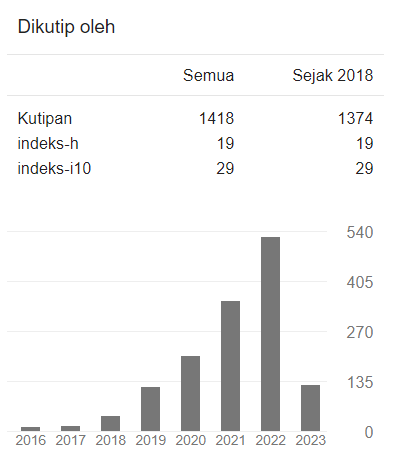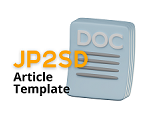Development of QR Code-Based Pocket Book Media on Solar System Materials to Increase The Science Literacy of Primary School Student
DOI:
https://doi.org/10.22219/jp2sd.v12i2.31797Keywords:
Science, learning media, pocket book, QR code, solar systemAbstract
This study aimed to overcome challenges in learning Natural Sciences (Science) and increase the scientific literacy of Grade VI students at SDN 1 Sumbergedong, Trenggalek Regency, by developing a QR Code-based Pocket Book on the solar system material. The research method used is R&D and follows ADDIE's steps to develop valid, practical and effective learning media. Validation results from material experts, media experts, and teachers show a very high level of validity, 93.56%. In comparison, small-scale and large-scale trials show a high level of practicality with an average of 98.25%. Evaluating the effectiveness of using N-Gain resulted in a significant increase in student understanding by 80%. Thus, the QR Code-based Pocket Book is an innovative alternative that has the potential to increase elementary school students' scientific literacy, overcome media limitations, and enrich the learning experience with interactive multimedia technology. It is very suitable for use in solar system learning materials.
Downloads
References
Abdullah, N., Khaldun, I., and Musman, M. (2021). The Influence Of Pocketbook To Improve Student Learning Outcomes And Motivation On Electron Configuration Material. Jurnal Penelitian Pendidikan IPA, 7(3), 298–304.
Anditasari, R., Martutik, M., and Andajani, K. (2018). Pengembangan Media Berbasis Permainan Edukatif pada Pembelajaran Menulis Teks Deskripsi. Jurnal Pendidikan: Teori, Penelitian, Dan Pengembangan, 3(1), 107–114.
Annisa, R. (2019). Aplikasi Belajar Tata Surya Berbasis Android Sebagai Media Pembelajaran Pendukung Kurikulum 2013 Untuk Siswa Sekolah Dasar. Jurnal Teknologi Informasi Dan Komputer Politeknik Sekayu, 9(1), 26–33.
Anugraheni, I., and Kristin, F. (2018). Pengembangan Media Pembelajaran Kurikulum 2013 di Kelas IV Tema 9 Subtema 1. Scholaria: Jurnal Pendidikan Dan Kebudayaan, 8(3), 285–292.
Aulia, C., Yuwana, R., Ariyanto, L., and Harun, L. (2023). Pengembangan Media Pembelajaran Pocket Book Berbasis Kearifan Lokal Untuk Meningkatkan Pemahaman Konsep Matematis Siswa SMP. Jurnal Ilmiah Pendidikan Matematika, 8(1).
Branch, R. M. (2021). Instructional Design : The ADDIE Approach. In Encyclopedia of Evolutionary Psychological Science.
Choirina, A. N., Bintartik, L., and Utama Candra. 2023. Pengembangan Booklet Materi Hubungan Antar Makhluk Hidup dalam Ekosistem dengan Penguatan Karakter Mandiri Siswa Kelas V SDN Karangsari 2. JP2SD (Jurnal Pemikiran Dan Pengembangan Sekolah Dasar). 11(2):209-227.
Erayani, L. G. N., and Jampel, I, N. (2022). Meningkatkan Kemampuan Literasi Sains dan Kemampuan Metakognitif Siswa melalui Model Problem Based Learning Berbantuan Media Interaktif. Jurnal Penelitian Dan Pengembangan Pendidikan, 6(2), 248–258.
Gilbert, J.K. (2011). Concept Development and Transfer in Context-Based Science Education. Int. Journal Science Education, 33 : 817-837.
Harefa, D., and Sarumaha, M. (2020). Teori Pengenalan Ilmu Pengetahuan Alam Sejak Dini. Indonesia: Pm Publisher.
Hidayani, R., Sabekti, A, W., and Yulita, I. (2020). The Practicality And Effectiveness Of Educational Game Developed Using Lectora Inspire In Chemical Equilibrium. Journal Of Chemistry Education Research, 4(2), 58–62.
Laily, N., Iswan., Amelia, P., and Hanifah, S. M. A. (2022). Pengembangan Media Pembelajaran Pocket Book Matematika Sd Materi Perkalian, Pembagian, dan Mata Uang Kelas II. Seminar Nasional Penelitian Lppm Umj, 1–19.
Latip, Abdul and Permanasari, Anna. (2015). Pengembangan Multimedia Pembelajaran Berbasis Literasi Sains Untuk Siswa SMP Pada Tema Teknologi. Makalah disajikan dalam Prosising Simposium Nasional Inovasi Pembelajaran Sains 2015.
Madjid, R, A. (2019). The Effect Of Use Audio Media Si Juara Towards Learning Outcomes Tunanetra Students In Mtslb/A Yaketunis Yogyakarta. Yogyakarta, Indonesia.
Mayer, RE. (2015). Role of Interactivity in Learning from Engineering Animation. Apllied Cognitive Pyschology, Appl. Cognit. Pyschol. 29: 614-620.
Mustaghfiroh, H. (2020). Analisis Kesesuaian Buku Sekolah Elektronik (Bse) Dan Non-Bse Ilmu Pengetahuan Alam SMP/MTs Kelas VIII Semester Genap Berdasarkan Science Textbook Rating System (Strs) Pada Aspek Kriteria Isi. Universitas Wiraraja.
OECD. (2019). PISA 2015 Assesment and Analytical Framework: Science, Reading, Mathematic, and Financial Literacy. Retrieved November 18, 2023, from PISA website: http://www.keepeek.com/Digital-Asset- Management/oecd/educa-tion/pisa-2015- assessment-and-analytical- framework_9789264255425-en#page2.
Puspitasari, M., and Primasatya, N. (2021). Pengembangan Media Pembelajaran Pocket Book Pada Materi Macam-Macam Sumber Energi Kelas Iv Sekolah Dasar.
Rohmah, S. N. 2020. Pengembangan Booklet Bangun Datar dan Sifat-sifatnya Berbasis Teori Van Hiele Berkarakter Mandiri Siswa Kelas III MI Qomarul Hidayah Trenggalek. Universitas Negeri Malang.
Rahmawati, F. (2013). Pengaruh Pendekatan Pendidikan Realistik Matematika dalam Meningkatan Kemampuan Komunikasi Matematis Siswa Sekolah Dasar. Prosding SEMIRATA 2013, 11.
Rusilowati, A and Pangestu, M.H., 2022. Application of simulation integrated learning model with video assisted MIKIR approach as an effort to improve understanding of earthquake mitigation. IOP Conference Series: Earth and Environmental Science . 986 (1).
Sugiyono. (2017). Metode Penelitian Kuantitatif, Kualitatif, dan R&D. Bandung, Indonesia: Alfabeta, CV.
Sugihartini, N and Yudiana, K. 2018. ADDIE sebagai Model Pengembangan Media Instruksional Edukatif (Mie) Mata Kuliah Kurikulum dan Pengajaran. Jurnal Pendidikan Teknologi dan Kejuruan. 15(2): 277.
Sulasriani, D. 2021. Pengembangan Booklet Berbasis QR Code Dengan Penguatan Karakter Mandiri Pada Materi Gaya Di Kelas IV SDN 2 Mojorembun Kabupaten Nganjuk. Universitas Negeri Malang.
Suprihatiningrum, J. (2013). Strategi Pembelajaran Teori & Aplikasinya. Yogyakarta, Indonesia: Ar-Ruzz Media.
Sutrisna, N. (2021). Analisis Kemampuan Literasi Sains Peserta Didik Sma Di Kota Sungai Penuh. Jurnal Inovasi Penelitian, 1(12), 2683–2694.
Untari, E. (2017). Problematika Dan Pemanfaatan Media Pembelajaran Sekolah Dasar Di Kota Blitar. Blitar, Indonesia.
Werdiningsih, D. (2021). Literasi sains dan materi pembelajaran Bahasa Indonesia. Jakarta, Indonesia.
Widjajanti, E. (2008). Kualitas lembar kerja siswa. Seminar Pelatihan Penyusunan LKS Untuk Guru SMK/MAK Pada Kegiatan Pengabdian Kepada Masyarakat Jurusan Pendidikan FMIPA Universitas Negeri Yogyakarta, 4(2), 189–200.
Yamin, M. R., and Karmila, K. (2020). Analisis Kebutuhan Pengembangan Media Pembelajaran Berbasis Cartoon Dalam Pembelajaran Ipa Pada Materi Lingkungan Kelas III Sd. Biology Teaching And Learning, 2(2).
Downloads
Published
Issue
Section
License
Copyright (c) 2024 Priya Kusuma Bahari, Lilik Bintartik, Candra Utama

This work is licensed under a Creative Commons Attribution-ShareAlike 4.0 International License.
Authors who publish with Jurnal Pemikiran dan Pengembangan Sekolah Dasar (JP2SD) agree to the following terms:
- For all articles published in Jurnal Pemikiran dan Pengembangan Sekolah Dasar (JP2SD), copyright is retained by the authors. Authors give permission to the publisher to announce the work with conditions. When the manuscript is accepted for publication, the authors agree to automatic transfer of the publishing right to the publisher.
- Authors retain copyright and grant the journal right of first publication with the work simultaneously licensed under a Creative Commons Attribution-ShareAlike 4.0 International License that allows others to share the work with an acknowledgment of the work's authorship and initial publication in this journal.
- Authors are able to enter into separate, additional contractual arrangements for the non-exclusive distribution of the journal's published version of the work (e.g., post it to an institutional repository or publish it in a book), with an acknowledgment of its initial publication in this journal.
- Authors are permitted and encouraged to post their work online (e.g., in institutional repositories or on their website) prior to and during the submission process, as it can lead to productive exchanges, as well as earlier and greater citation of published work (See The Effect of Open Access).

This work is licensed under a Creative Commons Attribution-ShareAlike 4.0 International License.


















